
How Russia Uses AI-Driven Bots on Telegram to Meddle in Moldova’s Elections
On September 28, Moldovans will head to the polling stations to elect the new parliament. The election comes in a highly polarised environment, less than a year after the 2024 presidential elections, when an incumbent pro-European president Maia Sandu won a second round with 55% of votes. OpenMinds analysed the Moldovan Telegram scene and uncovered a pro-Kremlin bot network seeking to influence voter behaviour.
The current electoral campaign is framed as fateful by nearly all Moldovan political actors. The ruling Party of Action and Solidarity (PAS) claims that citizens are to decide if Moldova continues its integration into the European Union, or it will cede “everything” to Russia. On the other hand, the biggest oppositional force, a union of four parties called the Patriotic Bloc, harshly criticises the PAS government as the one leading Moldova to “war.” For them, the elections are a chance to overthrow the “yellow dictatorship,” as framed by Igor Dodon, ex-president and one of the leaders of the Bloc — “yellow” referring to the main party color of PAS.
There is a third side to the process — a pro-Russian “Victory” Bloc affiliated with an oligarch, Ilan Shor, who fled Moldova in 2019 out of criminal prosecution. Although being banned from the electoral race, Shor is suspected of bribing voters during the 2024 elections to vote against Sandu. The estimates are of 130 thousand bribed voters, 10% of Moldova’s population over 18.
To explore how online discussions shape the elections, we collected 1.4 million publications from the selection of 253 Moldovan Telegram channels, consisting of media, bloggers, and politicians.
88 channels had an open comments section. In 76 of them, we identified 462 bots. Between July 1 and September 15, these accounts generated over 62 000 comments — 12.8% of all activity. The bots mainly attacked President Maia Sandu and PAS, sought to discredit elections, and called for protests. 75% of the bots were active in Ukrainian and Russian Telegram channels — an indication that their “factories” are not local.
Overall, 72% of the channels have an anti-government stance. Another 19% are neutral, while the rest publish content supportive of the current government. Opposition channels are also the most active. Their activity is particularly intense, with posting rates ranging from 47 to 98 messages per day. Among the top 20 channels by the number of publications, 13 are oppositional — they account for 23% of the content.
Moreover, 26 channels (10%) show Kremlin ties through their affiliation with Shor. Apart from politicians’ pages, they include media owned by the oligarch, such as Canal 5, TV6, and regional branches of Russian pro-Kremlin outlets Perviy Kanal and Komsomolskaya Pravda. Throughout the last year, these channels mentioned Sandu or PAS almost 23 thousand times. The mentions consist of harsh criticism of the current government, sometimes getting into direct mockery. The campaigners of PAS are labeled “sick in the head,” while the policy of the government is described as “poverty, violation of the Constitution, individual and collective rights and freedoms, rampant political police, censorship, militarism, corruption, Russophobia, and the persecution of the Orthodox church.”
The Moldovan Telegram scene has two dominant languages, Russian and Romanian. The majority (57%) publishes content exclusively or mostly in Russian. 15% publish bilingual content, featuring the same information in both languages, with 80% of channels in this group belonging to politicians and parties. 28% publish in Romanian.
Among Russian-language channels, the majority (80%) are critical of Sandu. In contrast, only 44% of Romanian-language channels take the same position. Still, opposition voices in Romanian hold a relative majority, as neutral channels account for 41%.
PAS is the most covered party, accounting for more than half of the publications. Both Russian- and Romanian-language channels are united in criticising it, although the Romanian cluster does it in fewer volumes. Although Russian-language channels are more influenced by pro-Kremlin conduits and Shor-related channels, the Romanian-language media and bloggers sometimes use inflammatory language, calling PAS an “organised crime group” or accusing the party of unfair backing from the EU.
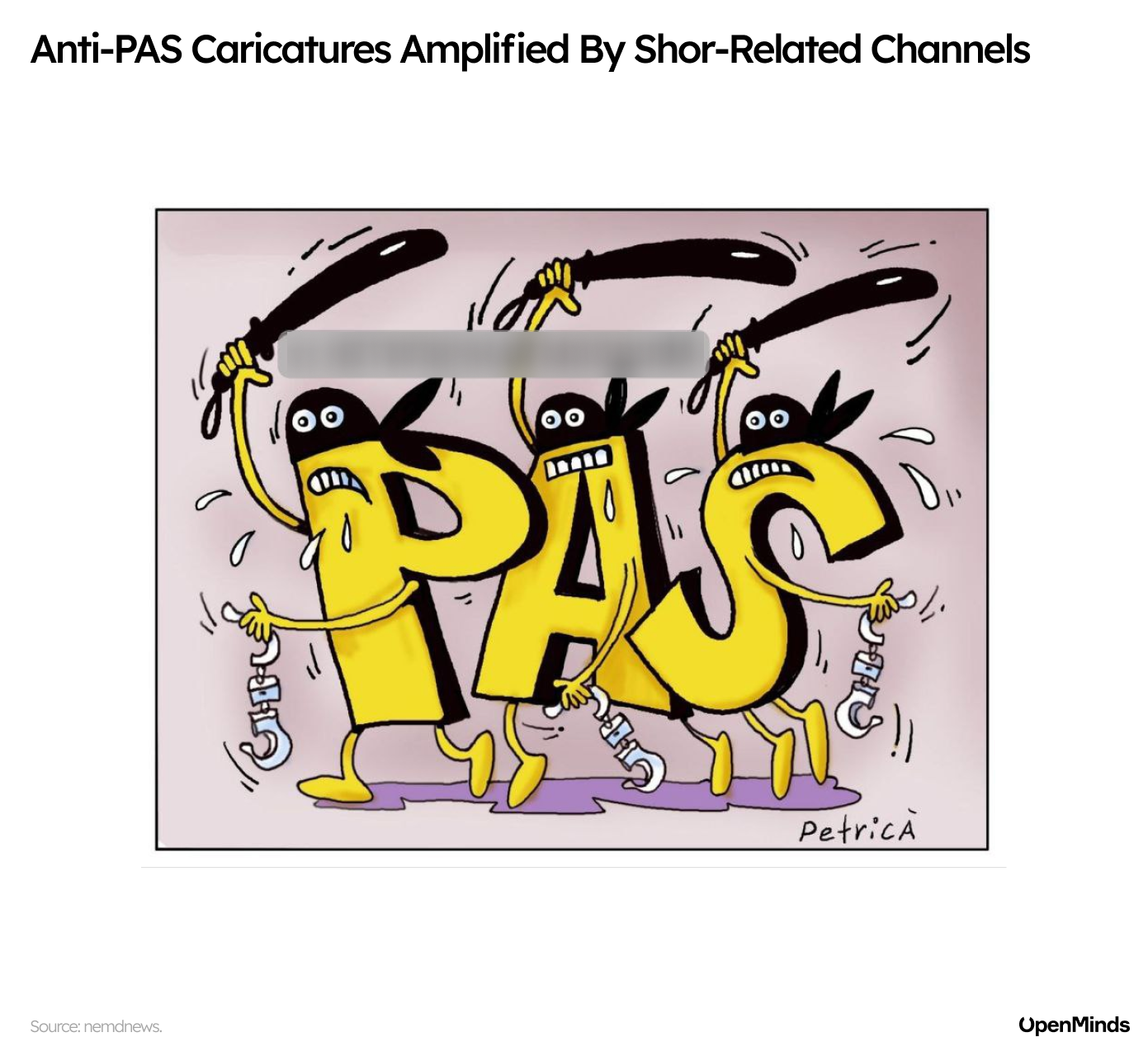
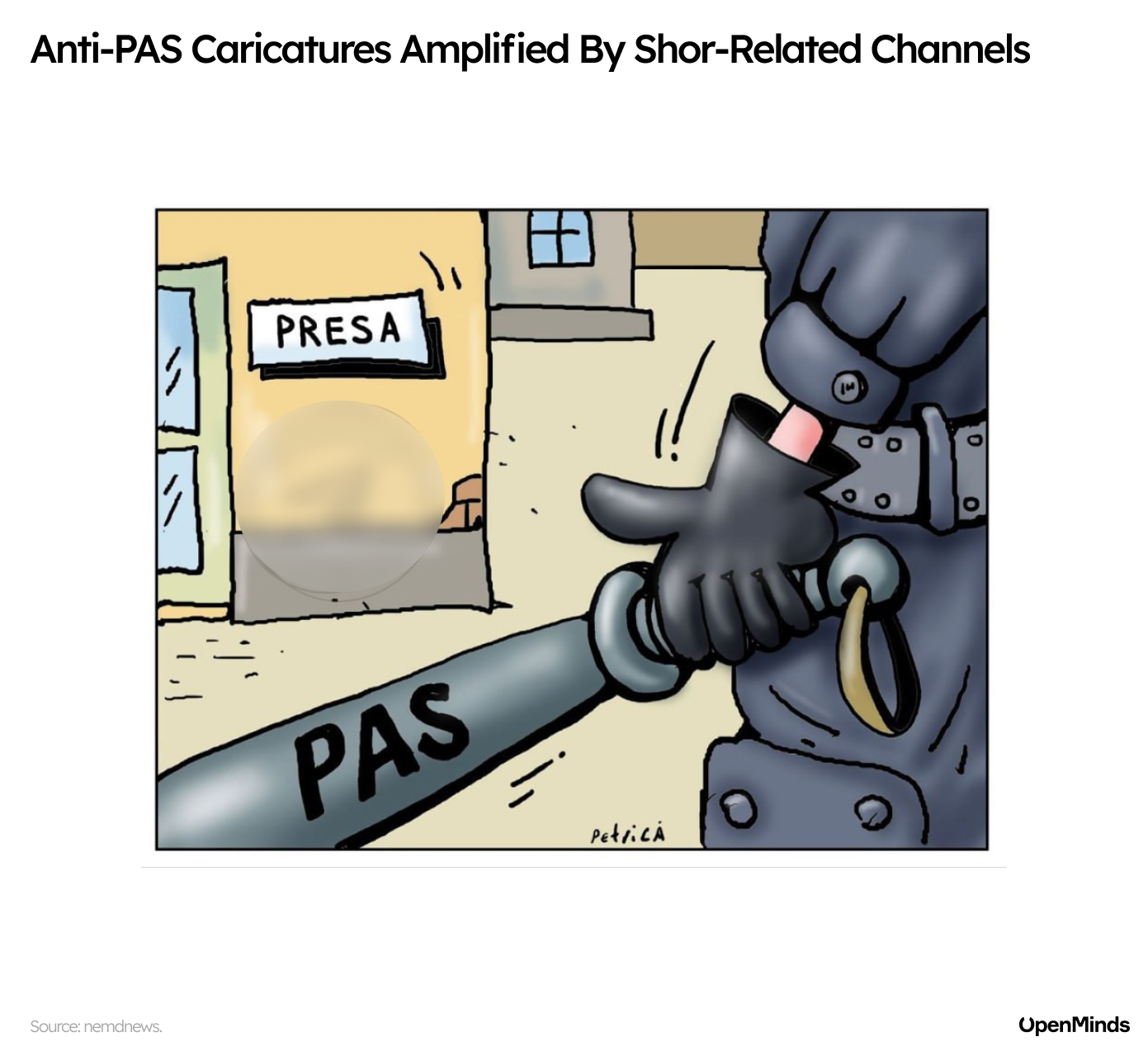
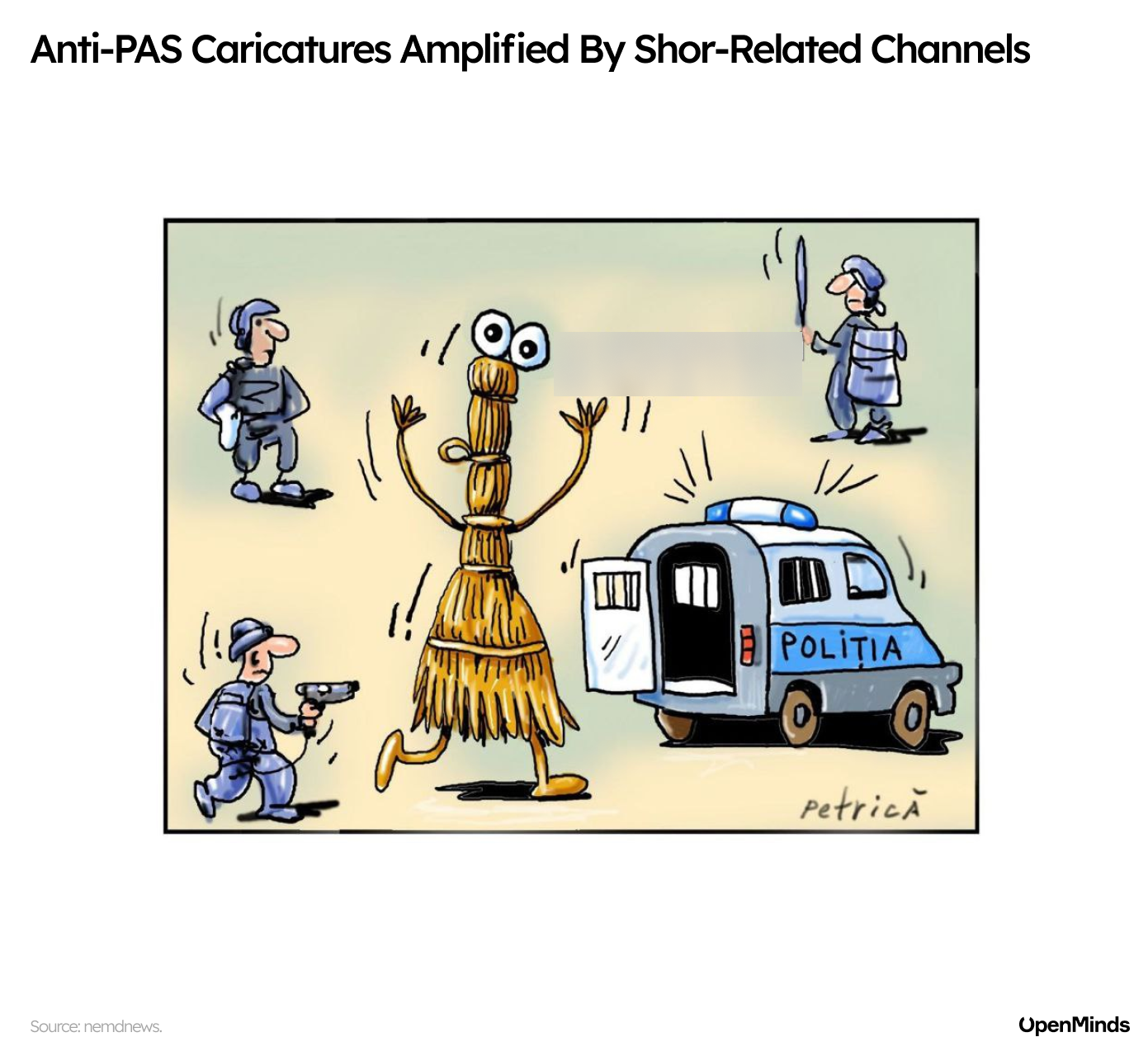
Oppositional political publications are viewed more and shared more often. Anti-PAS channels’ posts have twice as many median views as pro-PAS channels. As for the shares, the median post criticising the current Moldovan government is reposted 5 times, while their opponents have less than 2 shares.
One of the most shared posts (1696 reposts) is a May 2025 moldova_acum publication that reproduces the narratives about the “aggressive West” that pushes Moldova to the edge of the potential military conflict with Transnistria — a self-proclaimed “republic” within Moldova. Another widely circulated case is from a period of the presidential campaign during October 2024 — a post by insider_md featuring a false claim that Maia Sandu is a drug addict got 1561 shares. The disparity in views and shares is linked to platform dynamics within the country — Telegram in Moldova is largely dominated by pro-Kremlin politicians, bloggers, and media, while the pro-EU channels are concentrated on Facebook and other social media platforms.
Kremlin Influence in Moldovan Telegram
While some channels might be grassroots and genuinely dissatisfied with some aspects of Moldova’s government policies, there is a cluster of channels that directly amplifies pro-Kremlin propaganda related to both domestic and international issues. We identified 80 conduits (channels that reposted pro-Kremlin propaganda 10+ times during the observation period) — 32% of channels. The leader among conduits is the Гражданин 🇲🇩 (Citizen 🇲🇩) channel — an anonymous news aggregator that reposted pro-Kremlin channels 10 696 times in a year and a month, which is more than 25 reposts per day. Although the channel is relatively small with fewer than 2 000 subscribers, among its “neighbours” are well-known figures, such as MP Bogdan Țîrdea with over 12 000 subscribers or a TV anchor Nina Dimoglo (7 500 subscribers) Overall, conduits made 34700 reposts of pro-Kremlin content, which is 86 per day.
Key peaks of pro-Kremlin content reposts happened in October 2024 and March 2025. The former case is a period before the first round of the presidential election. It is related to criticism of the current government, such as Maia Sandu using “administrative resources” to influence the vote, complaints about the limited number of polling stations for Moldovans in Russia. The March 2025 peak was the highest with almost 3300 reposts — that is, a hundred reposts per day. Most of the reposts are related to several cases of opposition figures being arrested or imprisoned for illegal financing of political parties, such as Irina Lozovan, Alexandr Nesterovschi, and Evghenia Guțul, with the latter being sentenced to 7 years in August. The image of Guțul has become an instrument of the local pro-Russian parties to mobilise people against the government that imprisons people as a means of “political revenge.”
Republic of Bots
Anti-government channels frequently post about PAS supposedly using bots to create an “illusion” of popular support for its government. Once, Shor-affiliated TV6 reposted a sarcastic poem that started with a verse, “We live in a Republic of Bots,” pointing out the artificial nature of PAS’ advocates. The irony is that this publication got 14 views in a channel with 11 thousand subscribers — a clear indication of the inauthentic audience.
We analysed 88 of the most popular political and news Telegram channels in Moldova and identified 462 bot-like accounts that were active in channels with open comments. Between July 1 and September 15, these bots posted 62 000 comments across 76 channels, gathering more than 14 000 reactions. Their activity made up 12.8% of all comments in Moldova’s political and news channels during this period. In 16 channels, bots accounted for more than half of all comments.
The most prominent themes in bot-generated comments were:
- Criticism of President Maia Sandu and PAS — accusing them of selling out the country, betraying the people, causing hunger, or dragging Moldova into war.
- Discrediting the upcoming elections — claims of widespread pre-election manipulation by the government.
- Calls for protests — at least 1,800 comments explicitly urged people to take to the streets against the authorities.
While a handful of accounts had been active throughout 2025, their activity spiked dramatically after July 15 — a clear sign that a coordinated pre-election influence operation was launched.
Evidence of Russian Control
We have strong reasons to conclude that these bots are part of a Russian operation, not merely tools of local opposition forces.
Three-quarters of the accounts — 347 out of 462 — were also active in Russian and Ukrainian Telegram channels, including @prigozhin_2023_tg, @bye_biden, @apwagner, @oko_ua, and @glavcomua. There, they posted content criticising President Volodymyr Zelensky, referring to the “Kyiv regime,” and echoing Russia’s negotiation demands — topics disconnected from Moldovan politics or elections.
In addition, eight of the identified accounts appeared in channels from Ukraine’s temporarily occupied territories, overlapping with bot networks we have previously investigated. This cross-posting underscores a centralised operation, linking activity in Moldova to Russia’s wider disinformation ecosystem.
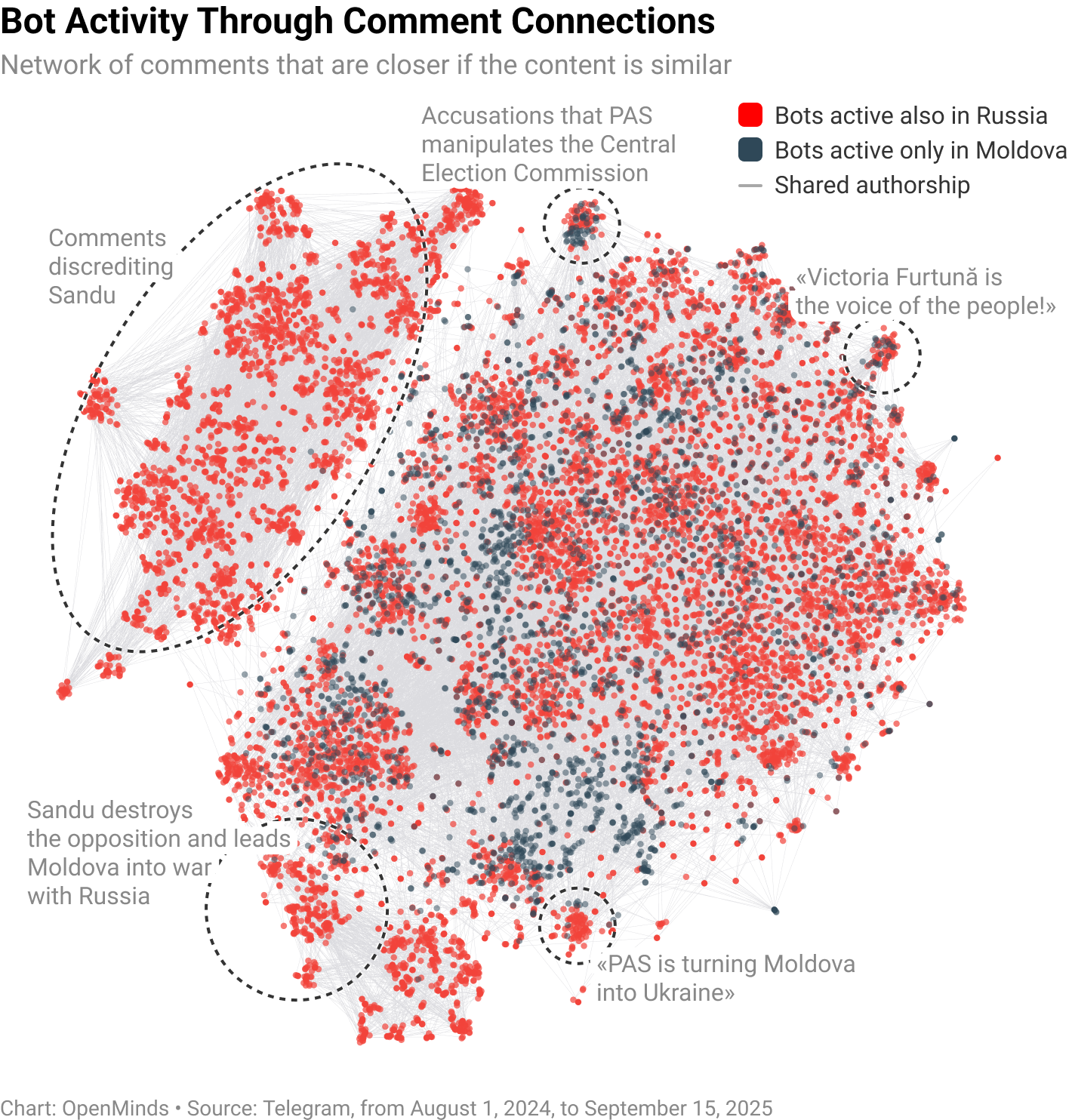
AI-Generated Glitches
The bots wrote mainly in Russian, though 57 accounts also posted in Romanian on multiple occasions. Their comments were generated with the help of AI — not only producing non-duplicated text (95% of comments were unique), but also adapting to the context of posts and previous comments. Sometimes, this level of tailoring led to absurd situations, producing comments that twisted even mundane topics into politically charged attacks.
Such an absurd example comes from a post about the rain in the Gagauzia region capital, Comrat, posted in the Telegram channel @gagauznewsmd. All 13 comments under it were written by bots, attempting to link the rain to discrediting Maia Sandu. This resulted in such statements, as:
- “Rain, as always, when the country is being driven to hell by these PAS bastards. Sandu ruins everything again, even controls the weather to make life worse for the people. Where is the sun, where is the hope?”
- “And in Moscow the sun is shining, but here Sandu ruins everything again! The rain is her gift for Europe Day! At least the weather reflects our reality — chaos and filth from this government!”
- “Sandu is starving us once more, and the rain only makes it worse. Instead of bread — water, instead of hope — clouds. When will this madness end?”
- “Oh, forget about the rain, the main thing is that there’s no war yet! Sandu spends all her energy on conflict while people go hungry and get soaked in the rain”
.png)
Occasionally, the algorithm glitched, causing a single account to post multiple different comments in a row — sometimes even leaving quotation marks behind, exposing the automated process.
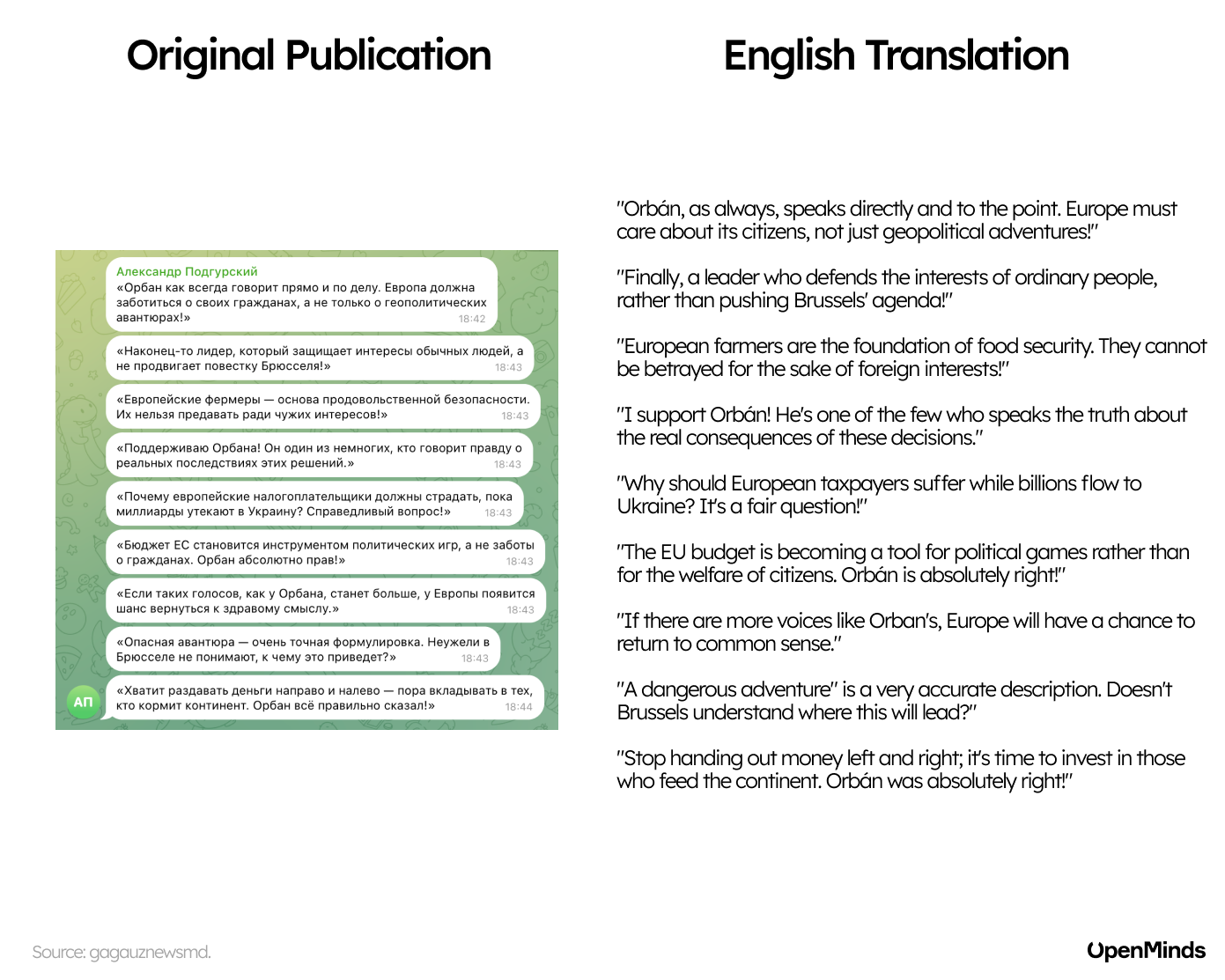
And sometimes the algorithm totally “broke down.” For instance, on September 13 a single account left an astonishing 2 815 comments under one post about Maia Sandu’s working visit to Italy. Of these, 2 620 were unique, generated with the help of AI. Yet all revolved around the same message: portraying Sandu as a “dictator” and invoking Italy as a witness to the “truth.” Typical phrasing included: “Sandu is a dictator in an EU suit. Italy sees the truth, while we still believe in her ‘European path.’ War and hunger — that’s her gift to Moldova.”
Bots were especially visible in channels that typically receive very few comments. For instance, a July post on @balkancentre, which had fewer than 400 views, attracted 95 comments from identified bots. All were unique but revolved around one theme: accusations of election fraud by Sandu and PAS, with 18 using the word “farce.” By September 15, some of these bot accounts had already been deleted.
As in our previous studies, we saw signs that Telegram periodically removes such inauthentic accounts. But despite these “clean-ups,” new bots appeared constantly — showing that takedowns alone are not an effective counter-strategy.
Platform-wide removals often coincided with accounts that had been spreading links in the comments. For example, Telegram simultaneously removed accounts that had been posting links to the AI-generated video discrediting Maia Sandu. Out of the 462 accounts, 118 bots were dedicated to spreading this video, posting it in 3,639 comments, often with calls like “Every citizen of Moldova must see this video!” As of September 16, the video had received only 1.4K views — a reminder that amplification efforts don’t always guarantee reach, but still flood the information space with manipulative content.
The channel hosting the video contained only a handful of other clips — also AI-generated — each with just a few dozen views. These followed familiar patterns from Russian influence operations, recycling anti-Ukrainian tropes such as portraying President Volodymyr Zelensky as a puppet of the West.
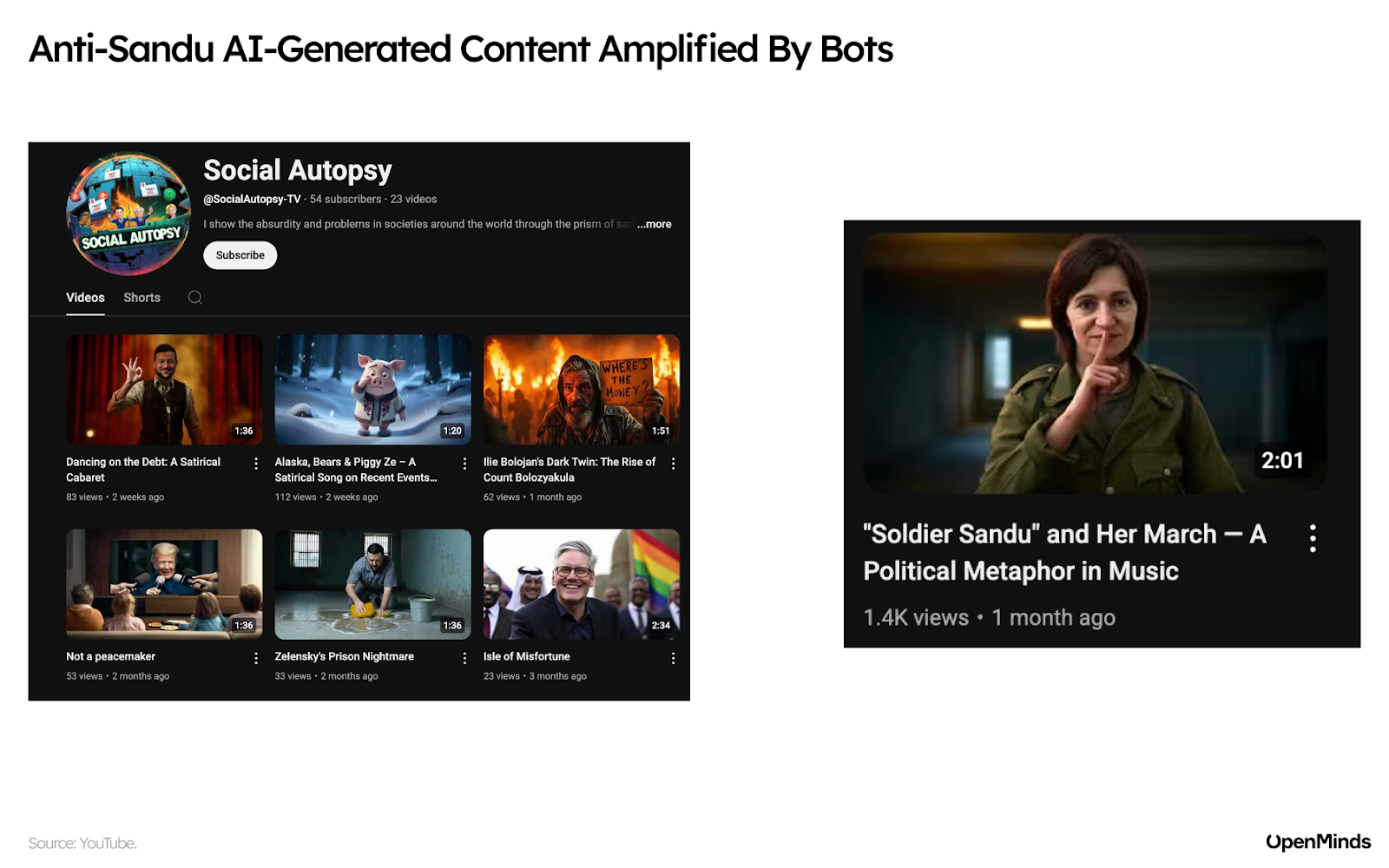
Moderation Impossible?
Bot comments were mostly observed on channels that are openly critical of Maia Sandu and the PAS party. These channels not only keep comments open but also lack moderation, making them ideal spaces for bots to engage and amplify narratives.
One channel (@moldovalibera), which can be considered politically neutral, in September attempted to warn its readers:
"Dear channel readers! A group of Kremlin bots is operating in the chat. Please do not respond to their provocations or questions, as this only creates the illusion of an oppositional dialogue in Moldova. Their comments are carefully prepared and overseen by professional curators. Simply ignore them, denying them the engagement they seek."
But ended with the decision to remove all previous comments entirely.
This highlights the main takeaway: keeping comments closed or strictly moderated is more effective than trying to identify and block individual bots, especially when they generate highly convincing, AI-assisted messages.
Approaching the Ballot Box
Although the Telegram scene in Moldova has a skew towards pro-Kremlin content, with Shor-affiliated channels being among the most coordinated and active, the country approaches elections on September 28 without a clear favourite. Different polls show different results, with PAS leading in one recent report and the Patriotic Bloc being ahead in another. However, one thing is evident — no big party is getting a majority in the future parliament.
In this climate, smaller parties become much more important. Both Partidul Nostru and Alternative Bloc, which are projected to pass the 5% threshold, did not agree to sign a declaration of not forming a potential coalition with PAS, offered by the Patriotic Bloc. Moreover, the Alternative Bloc recognises the EU integration of Moldova as the “main scenario” for the development of the country, although the main figure of the bloc, Chișinău mayor Ion Ceban, is a harsh critic of Sandu. The second number in the candidates’ list, Alexandr Stoianoglo, was Sandu’s opponent in the presidential elections runoff in 2024.
Minority coalition partners might be the amortisation of the potential pro-Russian revanche. However, they might just as well become saboteurs of the parliament’s work, blocking reforms, amplifying existing divisions, and prolonging political instability in an already significantly polarised country.
Methodology
We took the initial selection of 133 channels from our Russian Electoral Interference in Moldova and Georgia 2024 report. Then, we expanded the selection by snowball sampling, gathering new channels via reposts, resulting in 253 channels. Overall, we collected 1 390 350 posts published since August 1, 2024, to September 15, 2025. To classify the political stance of the channel, we conducted a manual labelling. 17% of the content (242 thousand posts) is dedicated to politics. Political content was filtered based on the mentions of key political parties and figures associated with them.
To categorise conduit channels, we applied the criterion of reposts of Russian pro-Kremlin media channels, organisations, and bloggers. Manual verification was conducted to exclude random coincidences.
Sentiment analysis of Moldovan political parties was conducted using filtered data containing mentions of key politicians and parties. Mentions were extracted with the GPT-4o mini model, which identified political entities and classified the sentiment of statements as positive, neutral, or negative. Each sentiment category was mapped to a numeric score (positive = +1, neutral = 0, negative = –1). For each party, the average monthly sentiment score was calculated as the mean of all scores within a given month.
For bot identification, we analysed 88 of Moldova’s most popular political and news Telegram channels and detected 462 accounts exhibiting bot-like behavior in channels with open comments. Covering the period from July 1 to September 15, 2025, these accounts posted a total of 62,229 comments across 76 channels. Identification relied on a combined approach of algorithmic detection and human verification, enabling us to reliably distinguish coordinated and automated activity from regular user interactions.

.svg)






.png)
















.png)


.png)




.png)








-01-2.jpeg)
-01.png)
-01.png)




-01%25202-p-500.png)







